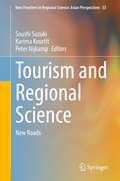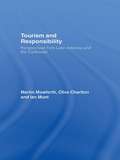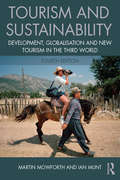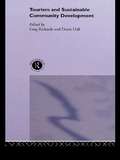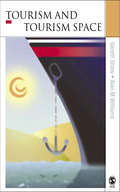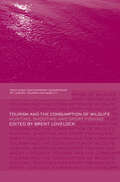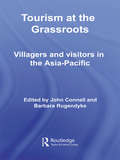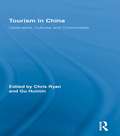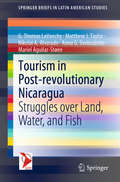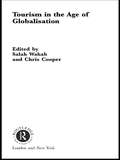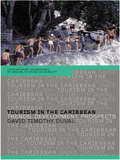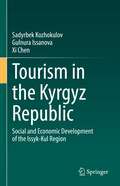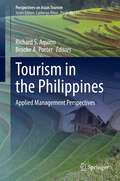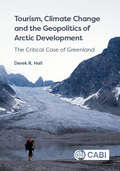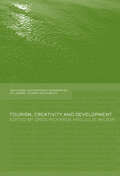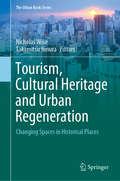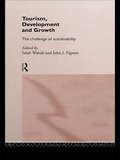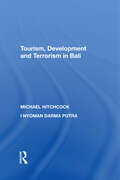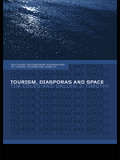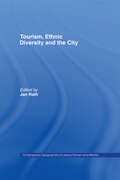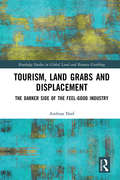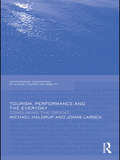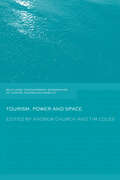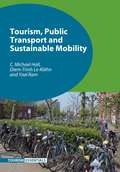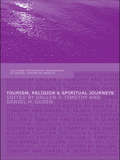- Table View
- List View
Tourism and Regional Science: New Roads (New Frontiers in Regional Science: Asian Perspectives #53)
by Peter Nijkamp Karima Kourtit Soushi SuzukiThis book provides new roads, perspectives, and a synthesis for tourism and regional science research. Tourism has become one of the most dynamic sectors in the economy and has exhibited a structurally growing importance over the past decades. In many countries the economic significance of tourism now exceeds that of traditionally strong sectors like agriculture or transportation.It is noteworthy that in recent times, tourism research has gained great momentum from the perspective of: the leisure society; the psychological tension between hard work and a more relaxed lifestyle; and the productivity-enhancing or productivity-diminishing effects of leisure, recreation, and tourism. An abundance of new literature in the field of tourism management can also be found, for instance, in the areas of hospitality management, cultural events management, destination competitiveness policy and marketing, and transportation and logistics strategies, while much attention is also being paid to the opportunities provided by digital technology for the tourism sector. In addition, in the light of the many negative externalities of a rapidly growing tourism sector, there is also an abundant literature on the environmental and sustainability effects of tourism.This book has the following objectives: to explore the interwoven connection between regional science and tourism research; to suggest promising pathways for innovative regional science research at the interface of tourism and space; and to demonstrate the need for a new perspective on the tourism and regional science nexus by means of empirical studies.
Tourism and Responsibility: Perspectives from Latin America and the Caribbean
by Ian Munt Martin Mowforth Clive CharltonThis book discusses the responsibility, or otherwise, of tourism activities in Latin America and the Caribbean. It considers issues such as the reduction of poverty through tourism and the conflict between increasing volumes of air travel spent in our continuing search for pleasure and the resulting contribution to global warming. The authors believe that tourism can only be adequately assessed through a consideration of how it fits into the structure of power. It is also argued that tourism cannot be analyzed without a consideration of its impacts on and links with development. This relationship between tourism, responsibility, power and development is explored in chapters covering both the macro and the micro level of responsibility. The authors look at methods of practising tourism responsibly or irresponsibly at the personal, company, national and international levels. The questions and dilemmas of "placing" responsibility in the tourism industry are examined throughout. Widely illustrating all these themes and issues with examples and case studies from throughout the sub-continent, this book will be of importance to students and academics and to the work of practitioners of development and tourism-related projects run by both governmental and non-governmental aid and development agencies.
Tourism and Sustainability: Development, globalisation and new tourism in the Third World
by Ian Munt Martin MowforthBy January 2015 the world’s richest 80 people had as much wealth as the poorest 50 per cent of the world’s population. It is a global unevenness through which the barriers to in-migration of Third World migrants to wealthy First World nations go ever higher, while the barriers to travel in the reverse direction are all but extinct. So how exactly does tourism contribute to narrowing this glaring inequality between the rich and poor? Are ever-expanding tourism markets a smoke-free, socioculturally sensitive form of human industrialisation? Is alternative tourism really a credible lever for reducing global inequality and eliminating poverty? Tourism and Sustainability critically explores the most significant universal geopolitical norms of the last half century – development, globalisation and sustainability – and through the lens of new forms of tourism demonstrates how we can better get to grips with the rapidly changing new global order. The fourth edition has been extensively revised and updated, and benefits from the addition of new material on climate change and tourism. Drawing on a range of examples from across the Third World, Mowforth and Munt expertly illustrate the social, economic and environmental conditions that continue to affect the tourism industry. With the first edition hailed by Geoffrey Wall as ‘one of the most significant books produced on tourism [since the turn of the millennium]’, Tourism and Sustainability remains the essential resource for students of human geography, environmental sciences and studies, politics, development studies, anthropology and business studies as well as tourism itself.
Tourism and Sustainable Community Development (Routledge Advances in Tourism #Vol. 7)
by Derek Hall Greg RichardsAs the tourist industry becomes increasingly important to communities around the world, the need to develop tourism in a sustainable manner has also become a primary concern. This impressive collection of international case studies addresses this crucial issue by asking what local communities can contribute to sustainable tourism, and what sustainability can offer these local communities in return. The role of the community in environmental, cultural and economic sustainability is highlighted in an extraordinary variety of contexts, ranging from inner-city Edinburgh to rural northern Portugal and the beaches of Indonesia. Individually, the investigations in this text present a wealth of original research and source material, while collectively, they illuminate and clarify the term 'community' - the meaning of which, it is argued, is vital to understanding how sustainable tourism development can be implemented in practice.
Tourism and Tourism Spaces
by Gareth Shaw Allan M WilliamsThis is a critical introduction to the relations between tourism, tourists, and tourism spaces. It fuses economic and cultural perspectives to explain how tourism is dependent on place and space, while at the same time as defining those places and spaces. Examining different levels of scale - from local to global - Tourism and Tourism Spaces is informed by the discussion of three key processes: - production and consumption of tourist spaces - consumption and commodification of tourist experiences - construction and reconstruction of tourist spaces Each chapter engages with different theoretical perspectives; is illustrated with comparative examples and case studies; uses tables, boxes and figures throughout; and concludes with a summary. An integrated and systematic review of a range of theoretical positions - that integrates economic and cultural - Tourism and Tourism Spaces will be a key resource for students of geography, sociology, management studies, hospitality studies, and leisure studies.
Tourism and the Consumption of Wildlife: Hunting, Shooting and Sport Fishing (Contemporary Geographies of Leisure, Tourism and Mobility)
by Brent LovelockConsumptive forms of wildlife tourism (hunting, shooting and fishing) have become a topic of interest – both to the tourism industry, in terms of destinations seeking to establish or grow this sector, and to other stakeholders such as environmental organisations, animal-rights groups, and the general public. Hunting tourism, in particular, has come under fire with accusations that it is contributing to the demise of some species. Practices such as "canned hunting" (within fenced safari parks) or the use of hounds are described as unethical, and fishing tourism too has attracted recent negative publicity as it is said to be cruel. At the same time, however, many peripheral and indigenous communities around the world are strategising how to capitalise on consumptive forms of wildlife tourism. This book addresses a range of contentious issues facing the consumptive wildlife tourism sector across a number of destinations in Europe, North America, Africa, India, Arabia and Oceania. Practices such as baited bear hunting, trophy hunting of threatened species, and hunting for conservation are debated, along with the impact of this type of tourism on indigenous communities and on wider societies. Research on all aspects of "consumptive wildlife tourism" is included, which for the purposes of the book is defined to include all tourism that involves the intended killing of wildlife for sport purposes, and may include the harvest of wildlife products. This includes, among others, recreational hunting, big-game hunting and safari operations, traditional/indigenous hunting, game-bird shooting, hunting with hounds, freshwater angling and saltwater game fishing etc. This is the first book to specifically address tourist aspects of consumption of wildlife. It will appeal to tourism and recreation academics and students, tourism industry operators, community tourism planners and wildlife managers.
Tourism at the Grassroots: Villagers and Visitors in the Asia-Pacific (Contemporary Geographies Of Leisure, Tourism And Mobility Ser.)
by John Connell Barbara RugendykeIn two regions where tourism is of considerable economic importance, eastern Asia and the Pacific, there have been remarkably few studies of the impacts of tourism in rural areas. Moreover, the shift towards ecotourism, touted as a more environmentally benign form of tourism, has extended the reach of tourism into more remote and fragile envir
Tourism in China: Destination, Cultures and Communities (Routledge Advances in Tourism)
by Chris Ryan Gu HuiminChina is forecast to be the primary tourist destination and tourist-generating country by 2020. However, much of the writing on tourism in China has come from people within the English academic world who are not involved in the issues related to Chinese tourism development. This book provides a voice to Chinese mainland academic researchers and examines the nature of tourism research and tourism development in China. Contributors, many of whom are based in China and are immersed in the daily issues of teaching, researching and planning tourism development within China, discuss issues related to resource use, destination image and community participation with case studies that combine conceptual frameworks and practical issues. This authoritative text on tourism in China will be of interest to scholars and students of tourism throughout the world.
Tourism in Post-revolutionary Nicaragua: Struggles over Land, Water, and Fish (SpringerBriefs in Latin American Studies)
by Matthew J. Taylor Mariel Aguilar-Støen G. Thomas LaVanchy Nikolai A. Alvarado Anna G. SveinsdóttirThis book interrogates the impact of tourism on local lives and environments along the southern Pacific Coast of Nicaragua. Nicaragua has turned to tourism to earn needed foreign exchange and to provide jobs. The unplanned boom, however, has come with costs to local environments. Using an in-depth case study of the community of Gigante and nearby tourism developments, the chapters delve into the impact of recent unregulated booms in tourism on groundwater, household water security, local economies, culture, land ownership, and artisanal fisheries.
Tourism in the Age of Globalisation (Routledge Advances in Tourism)
by Chris Cooper Salah WahabThe revolutionary progress achieved in information and communication technology is gradually transforming the world into a global village. This volume, edited by an eminent board of international specialists, evaluates the nature and resilience of the emerging global economy and its implications for tourism.
Tourism in the Caribbean: Trends, Development, Prospects (Contemporary Geographies of Leisure, Tourism and Mobility #Vol. 3)
by David Timothy DuvalThe Caribbean is one of the premier tourist destinations in the world. Changes in travel patterns, markets and traveller motivations have brought about considerable growth and dramatic change to the region's tourism sector. This book brings together a high calibre team of international researchers to provide an up-to-date assessment of the scope of tourism and the nature of tourism development in the Caribbean. Divided into three parts, the book: gives an overview of existing tourism trends in the region addresses tourism development issues, including sustainability, ecotourism, heritage tourism, community participation, management implications, and linkages with agriculture considers future trends, including an assessment of recent world events and their impacts on tourism in the region, and future trends in terms of airlift, economic sustainability and markets. A valuable resource for students of tourism and Caribbean studies, as well as governments, and national and regional tourism offices, this topical volume brings together excellent contributions to assess and analyze the state of the Caribbean tourism; past, present and future.
Tourism in the Kyrgyz Republic: Social and Economic Development of the Issyk-Kul Region
by Xi Chen Gulnura Issanova Sadyrbek KozhokulovThis book aims to identify the impact of tourism on social and economic development in the Issyk-Kul region of Kyrgyzstan, and to predict the development of the tourism industry and identify any limiting factors for the development of the tourism industry in the Republic as a whole. The impacts of tourism on the region have been poorly understood since the country gained independence in 1991, and so improved methods for identifying and increasing the contribution of the tourism industry to the economic and social development of the region are needed. The book assesses the impact of tourism on the socio-economic situation in the Issyk-Kul region is assessed on the basis of statistical modelling and GIS mapping, provides a comparative analysis of the categories and types of tourism in the regions of the Republic, in particular in the Issyk-Kul region, and identifies factors that have a negative impact on the country’s tourism potential, as well as the shortcomings and prospects for future development. The book's primary audience will be scholars and researchers whose research focuses on the socio-economic impacts of tourism, as well as students and planners. It is expected that it will become a source of information and inspiration for all readers who feel responsible for initiating sustainable development and sustainable use of tourism resources in Kyrgyzstan and other countries.
Tourism in the Philippines: Applied Management Perspectives (Perspectives on Asian Tourism)
by Richard S. Aquino Brooke A. PorterThis edited book serves as the first instalment of a two-part title that aims to provide an academic exploration of the contemporary issues and perspectives on tourism in the Philippines. With a strong geographical focus, this book is the first country-focused volume under the series, Perspectives on Asian Tourism. Comprised of chapters based on conceptual and empirical research, this book aims to develop a foundational and practical knowledge base on Philippine tourism management. The chapters cover a range of national, regional, and local tourism management issues that cut across the following themes:• Governance issues in Philippine tourism destinations• The Tourism Act of 2009 • Tourism impacts and sustainability• Innovative tourism development strategies• Tourism marketing campaigns (i.e., It's More Fun in the Philippines!)• Philippine tourism and the ASEAN integration• Tourism and hospitality education in the PhilippinesThe contributions are drawn from the works of Filipino academics based in the Philippines and overseas institutions, and international academics researching tourism issues in the Philippines. The chapters are informed by a diverse set of disciplines including, but not limited to tourism studies, hospitality management, marketing, human resources management, public policy, environmental management, community development, and education.This edited book is divided into four parts: first, an introduction to the development of policy and contemporary management issues in Philippine tourism; second, nature-based tourism and the natural environment; third, product development and branding; and fourth, accreditation and industry standards. The volume culminates with a synthesis of the progress of Philippine tourism development and management implications using the cases and experiences outlined in the chapters. This book serves as a systematic guide to the current state of tourism development and management in the Philippines, and as essential reading for undergraduate and postgraduate students, researchers, educators, and, more importantly, tourism policy-makers.
Tourism, Climate Change and the Geopolitics of Arctic Development: The Critical Case of Greenland
by Derek HallGreenland is becoming a critically important territory in terms of tourism, climate change and competition for resource access, yet it has been poorly represented in academic literature. Tourism now features as a major source of income for the territory alongside fisheries. Cruise tourism is increasing rapidly, and might superficially appear to be best suited to Greenlandic conditions, given the lack of large-scale accommodation infrastructure and almost non-existent land routes between settlements. Ironically, one of the most spectacular tourist attractions is the large number of icebergs that are being calved as the result of glacier retreat and ice cap melting, both appearing to be taking place at ever increasing rates. As a consequence of ice removal, the territory's claimed extensive range of mineral resources, not least rare earth elements and hydrocarbons, are becoming more accessible for exploitation and, thereby, are acting increasingly as the focus for geopolitical competition. This book explores the nature of dynamics between tourism, climate change and the geopolitics of natural resource exploitation in the Arctic and examines their interrelationships specifically in the critical context of Greenland, but within a framework that emphasises the wider global implications of the outcomes of such interrelationships. This book is the first to explore these interrelationships in depth in English.
Tourism, Creativity and Development (Contemporary Geographies of Leisure, Tourism and Mobility)
by Greg Richards Julie WilsonDestinations across the world are beginning to replace or supplement culture-led development strategies with creative development. This book critically analyzes the impact and effectiveness of creative strategies in tourism development and charts the emergence of 'creative tourism'. Why has ‘creativity’ become such an important aspect of development strategies and of tourism development in particular? Why is this happening now, apparently simultaneously, in so many destinations across the globe? What is the difference between cultural tourism and creative tourism? These are among the important questions this book answers. It critically examines the developing relationship between tourism and creativity, the articulation of the ‘creative turn’ in tourism, and the impact this has on theoretical perspectives and practical approaches to tourism development. A wide range of examples from Europe, North America, Asia, Australia and Africa explore the interface between tourism and creativity including: creative spaces and places such as cultural and creative clusters and ethnic precincts; the role of the creative industries and entrepreneurs in the creation of experiences; creativity and rural areas; the 'creative class' and tourism; lifestyle, creativity and tourism and marketing creative tourism destinations. The relationship between individual and collective forms of creativity and the widely differing forms of modern tourism are also discussed. In the concluding section of the book the contribution of creativity to tourism and to development strategies in general is assessed, and areas for future research are outlined.The diverse multidisciplinary contributions link theory and practice, and demonstrate the strengths and weaknesses of creativity as a tourism development strategy and marketing tool. It is the first exploration of the relationship between tourism and creativity and its consequences for tourism development in different parts of the world.
Tourism, Cultural Heritage and Urban Regeneration: Changing Spaces in Historical Places (The Urban Book Series)
by Nicholas Wise Takamitsu JimuraUrban regeneration is often regarded as the process of renewal or redevelopment of spaces and places. There is a need to look at tourism and urban regeneration with a particular focus on cultural heritage. Cultural heritage consists of tangible heritage (such as historic buildings) and intangible heritage (such as events). The wider need and impact for such work is that places plan for change to keep up with the shifts in demand in the global economy in order for places to maintain a competitive advantage. Moreover, places need to keep up with the pace of global change or they risk stagnation and decline as increased competition is resulting in increased opportunities and choice for consumers.Each chapter in this book explores a specific form of cultural heritage that is driving change in urban spaces. Intended for a wide readership, the book will appeal to students of urban studies, human geography, heritage studies and international tourism management, as well as experts conducting research in and across these areas.
Tourism, Development and Growth: The Challenge of Sustainability
by John J. Pigram Salah WahabDistinguishing between sustainable development and sustainable tourism, the authors examine whether, and in what form, tourism can contribute to sustainable development and growth. Focusing on different types of tourism appropriate to particular situations, the team of leading contributors draws on examples from around the world - Canada, USA, Spain, Belgium, UK, Australia - to explore tourism's contribution to the economic, social, political and environmental advancement of developing countries and the importance of tourism in industrialised nations. This book examines the new policies and initiatives established by both the private sector and the state to pursue sustainable tourism growth and identifies the opportunities and challenges inherent in achieving it.
Tourism, Development and Terrorism in Bali
by Michael HitchcockThis book investigates tourism as a form of globalization within the context of the island of Bali, which has been voted the world's top island destination for the third time running by American travellers. The volume covers the onset of the Asian Crisis, the largest stock-market crash since the Great Depression. The authors chart the turbulence that has afflicted the island at a time of market uncertainty and global political strife and analyze the responses of Bali's business and community leaders to the crises that have buffeted the island since the fall of Suharto. In particular, the book analyzes crisis management with regard to the Bali Bombings, the impact of the bombings on the tourism development cycle and investigates the motives of the bombers. The authors argue that the actions of the bombers can best be understood with regard to the rise of political Islam as a global issue and the book breaks new ground with an analysis of the bombers' global experiences. The book also examines home-grown resistance to certain aspects of globalization, notably the attempt to turn Besakih, the island's mother temple, into a World Heritage Site and top tourist destination.
Tourism, Diasporas and Space (Contemporary Geographies of Leisure, Tourism and Mobility)
by Dallen J. Timothy Tim ColesDiasporas result from the scattering of populations and cultures across geographical space and time. Transnational in nature and unbounded by space, they cut across the static, territorial boundaries more usually deployed to govern tourism. In a vibrant inter-disciplinary collection of essays from leading scholars in the field, this book introduces the main features and constructs of diasporas, and explores their implications for the consumption, production and practices of tourism. Three sets of mutually reinforcing relationships are explored: experiences of diaspora tourists the settings and spaces of diaspora tourism the production of diaspora tourism. Addressing the relationship between diasporic groups and tourism from both a consumer and producer perspective, examples are drawn from a wide spectrum of diasporic groups including the Chinese, Jewish, Southeast Asian, Croatian, Dutch and Welsh. Until now, there has been no systematic and detailed treatment of the relationships between diasporas, their consumptions and the tourist experience. However, here, Coles and Timothy provide a unique navigation of the nature of these inter-connections which is ideal for students of tourism, sociology, cultural studies.
Tourism, Ethnic Diversity and the City (Contemporary Geographies of Leisure, Tourism and Mobility)
by Jan RathTourism, Ethnic Diversity and the City fills a gap in existing research in terms of how immigration relates to urban tourism and investigates the new theoretical insights and challenges for empirical research using informative case studies drawn from several advanced economies in Europe, North America and Australia. This enlightening book clearly explores the frontiers of knowledge on the interrelationship between tourism, migration, ethnic diversity and place. Exploring further the manifestations of ethnic diversity that have been commodified by immigrants in gateway cities, questioning how these expressions of culture can be transformed into vehicles for further developing the urban tourism economy. Tourism, Ethnic Diversity and the City presents a multidisciplinary approach drawing on key names from the field of geography, sociology, planning and political science and will appeal to those with an interest in any of these areas.
Tourism, Land Grabs and Displacement: The Darker Side of the Feel-Good Industry (Routledge Studies in Global Land and Resource Grabbing)
by Andreas NeefThis book examines the global scope of tourism-related grabbing of land and other natural resources. Tourism is often presented as a peaceful and benevolent sector that brings people from different cultural backgrounds together and contributes to employment, poverty alleviation, and global sustainable development. This book sheds light on the lesser known and much darker side of tourism as it unfolds in the Global South. While there is no doubt that tourism has been an engine of economic growth for many so-called developing countries, this has often come at the cost of widespread dispossession and displacement of Indigenous and non-indigenous communities. In many countries of the Global South, tourism development is increasingly prioritised by governments, businesses, international financial institutions and donors over the legitimate land and resource rights of local people. This book examines the actors, drivers, mechanisms, discourses and impacts of tourism-related land grabbing and displacement, drawing on more than thirty case studies from Latin America and the Caribbean, sub-Saharan Africa, South and Southeast Asia, the Middle East and the Southwest Pacific. The book provides solid grounds for an informed debate on how different actors are responsible for the adverse impacts of tourism on land rights infringements, what forms of resistance have been deployed against tourism-related land grabs and displacement, and how those who have violated local land and resource rights can be held accountable. Tourism, Land Grabs and Displacement will be essential reading for students and scholars of land and resource grabbing, tourism studies, development studies and sustainable development more broadly, as well as policymakers and practitioners working in those fields.
Tourism, Performance and the Everyday: Consuming the Orient (Contemporary Geographies of Leisure, Tourism and Mobility)
by Jonas Larsen Michael HaldrupTourism has become increasingly ‘exotic’, a process made possible by low-cost charter tourism and cheaper air tickets. Faraway and evermore ‘exotic’ holidays are becoming widespread and within reach as destinations make their entry into the mass tourism market. Strolls through the bazaars of Istanbul and cruises on the Nile are packaged into the sea, sand and sun culture of traditional forms of organized mass tourism. At the same time new technologies weave the fabric of tourism and everyday life even closer, circulating images, information, and objects between them. Taking off from this observation, Tourism, Performance and the Everyday invites readers to follow the flow’s of tourist desires, objects, meanings, photographs, fears, dreams and memories weaving together the spaces of and between Western Europe, Turkey and Egypt. Tourism, Performance and the Everyday carefully analyzes the cultural and social impacts of mass-tourist experiences of ‘exotic’ places on the wider aspects of everyday life. It treats mass-tourism as a cultural phenomenon that feeds into the practices and networks of peoples’ everyday lives rather than as an isolated, trivial or ‘exotic’ event. It traces how these impacts are mediated by various mobilities between home and away through innovate mobile and ethnographic research methods at tourist destinations and the home of tourists. The book contains analysis of diaries, photographs, blogs and photo web sharing sites, participant observation of performing tourists and ‘home ethnographies’ of the afterlife tourist photographs, souvenirs and memories. In doing this, the book traces out the multiple interconnections and mobilities between everyday spaces and leisure spaces as well as the multiple ways in which the Orient is consumed on holiday and at home. The book appeals to a wide audience among students, researchers and educators within the social and cultural sciences studying, researching and teaching theories and methods of tourism, Orientalism and cultural encounters as well as broader issues of leisure, consumption and everyday life.
Tourism, Power and Space (Contemporary Geographies of Leisure, Tourism and Mobility)
by Tim Coles Andrew ChurchThis is the first volume to explicitly consider how leisure and tourism acts as a major focus by which power may be understood in a geographical context. Key thinking and major approaches to unravelling the complexities of power are outlined in this collection and their relevance to current and future tourism studies is discussed. Tourism, Power and Space blends theoretical perspectives from leading power theorists such as: Parsons, Foucault and Clegg. Exploring the intricacies of the relationships between power, tourism and leisure, this stimulating volume combines theoretical and empirical writings to illustrate the extent to which power, in its various forms and guises and at various scales of operation, impacts on the unfolding structures, practices and organization of tourism and leisure on both the demand and supply sides. Divided into three sections: Power, Performance And Practice, Power, Property And Resources and Power, Governance And Empowerment; this text will be a useful resource for students and academics alike.
Tourism, Public Transport and Sustainable Mobility
by C. Michael Hall Diem-Trinh Le-Klähn Yael RamThis book offers a comprehensive global examination of the relationship between public transport and tourism as well as exploring other sustainable transport modes. It offers a unique view by analysing tourism through the public transport lens and vice versa. The volume provides an account of how the public transport experience can be improved for tourists so that its value can be maximised and a greater number of people can be encouraged to shift modes. It features a wide range of case studies and examples showing how the tourism industry, as well as regional economies, communities and the environment, benefit when public transport is widely used by tourists. The book will be of interest to researchers and students in the fields of tourism and transport as well as destination marketing organisations and tourism, transport and urban planners.
Tourism, Religion and Spiritual Journeys (Contemporary Geographies of Leisure, Tourism and Mobility)
by Dallen J. Timothy Daniel H. OlsenReligion and spirituality are still among the most common motivations for travel - many major tourism destinations have developed largely as a result of their connections to sacred people, places and events. Providing a comprehensive assessment of the primary issues and concepts related to this intersection of tourism and religion, this revealing book gives a balanced discussion of both the theoretical and applied subjects that destination planners, religious organizations, scholars, and tourism service providers must deal with on a daily basis. Bringing together a distinguished list of contributors, this volume takes a global approach and incorporates substantial empirical cases from Hinduism, Islam, Judaism, Roman Catholicism, Mormonism, New Ageism, Sikhism, Buddhism, and the spiritual philosophies of East Asia. On a conceptual level, it considers, amongst other topics: contested heritage the pilgrim-tourist dichotomy secularization of pilgrimage experiences religious humanism educational aspects of religious tourism commodification of religious icons and services. A vibrant collection of essays, this outstanding book discusses many important practices, paradigms, and problems that are currently being examined and debated. It raises an array of significant and interesting questions and as such is a valuable resource for students, scholars and researchers of tourism, religion and cultural studies.
